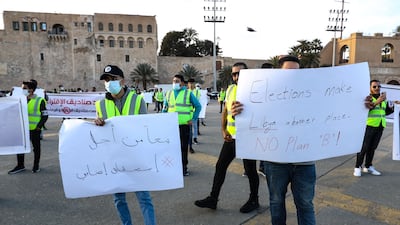The long-standing dispute over the mandate of the current government in Libya risks creating a new parallel administration and a power vacuum, political experts say.
The delay to presidential and legislative polls has exposed a deep mistrust among the major political powers, who have locked horns over whether to deliver the vote first or form a new transitional government.
“We are going down a rabbit hole,” Libyan political analyst Fathi Omar Al Turbi told The National. “I can see the country descending into chaos and disorder after a few months of a ceasefire and fragile unity.”
Nearly a month after the missed deadline to hold the vote, there are more serious political challenges and rivalries in store.
On Tuesday, parliamentary speaker Aguila Saleh called for the termination of the interim national unity government on the grounds that its mandate expired on December 24.
That was the date when the elections were delayed because of disputes over the laws governing the electoral process and the candidacy of some figures.
Hours later, Prime Minister Abdul Hamid Dbeibah on his public Facebook page criticised what he considered attempts to marginalise the government voice in running the country’s affairs.
He announced that the Central Bank had transferred an overdue household grant for children under 18 – about $22 for each child – to the bank accounts of the registered families, ignoring the naysayers and sending a clear message to his opponents that he was still in charge.
Opting for elections would be the most efficient route, said Hamish Kinnear, Middle East and North Africa analyst at Verisk Maplecroft, an international risk consultancy.
“Creating a new interim government is just adding another complication,” Mr Kinnear told The National. “The longer elections are pushed back, the more the legitimacy of the current national unity government will come under attack. If no political solution can be found, a renewed conflict will become more likely.”
Borderline candidates
Ten years after the Nato-backed overthrow of Muammar Qaddafi that plunged Libya into civil war, unity is an elusive commodity in the country.
In 2014, a parallel government emerged in the east to compete for leverage against an internationally-backed government in the west.
Each government had its own political and financial institutions and claimed legitimacy.
The warring parties agreed to a ceasefire, mediated by the UN in October 2020, which led to the formation of the incumbent interim national unity government.
The military hostilities ended but both sides remain wary of each other and failed to agree on a legal framework for the long-awaited presidential and legislative elections.
The rival politicians should agree to hold the legislative polls before the presidential elections, said Abdel Qadir Al Huwaili, a senior member of the State Council, an advisory body.
“You can’t put the cart before the horse,” Mr Al Huwaili, a supporter of the Dbeibah executive and a vocal critic of the current election laws, told The National.
“We should launch overdue sweeping reforms to the election laws and change the members of the High Election Commission for the sake of transparency and credibility.”
Mr Al Huwaili was particularly critical of borderline candidates.
“I haven’t heard of any country where the speaker of parliament decides all of a sudden to [contest] the presidential race, then he presides over parliamentary sessions when the election is delayed," he said, referring to Mr Saleh. "This is a farce.”
Fears of renewed conflict
Libya has never elected a president democratically nor had a parliamentary election since 2014.
Mr Al Turbi said the growing stalemate paints a very problematic picture for the country.
“Every Libyan must be aware that Libya has been a failed state for years," he said. "Today, the politicians are arguing whether to hold the elections first or to form a new government, while they are unable to provide the very basic necessities of everyday services to the people.”
Amid the political and economic chaos, it is hard to accurately gauge poverty levels.
Data supplied over the past years by the rival entities are contradictory and it is almost impossible to get an independent audit of the country’s finances.
The economy is crippled by the conflict and there are recurrent blockades and closures of vital oil fields, the main source of income.
Households still struggle with food insecurity, poverty, and poor public service delivery, according to the latest review by the World Bank.
Businesses and people struggle to carry out basic financial transactions or bank transfers because of the divisions, and the existing stand-off between the governor of the Central Bank in the west and his deputy in the east.
UN advisers, who held talks with key regional backers this month, including Egypt and Turkey, are calling on the parliament to focus on delivering the vote rather than appointing a new transitional administration.
The delayed vote also threatens to create a power vacuum, and major western players led by the US and the UK have urged the transitional government to remain in power in Libya until the vote is held.
Adding to the political complexity, the parliament already passed in September a vote of no confidence in the government. It is still operational nevertheless.
















